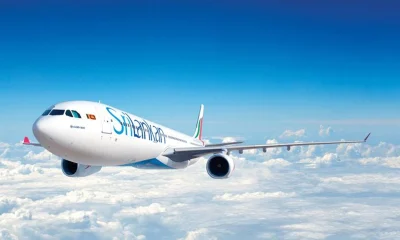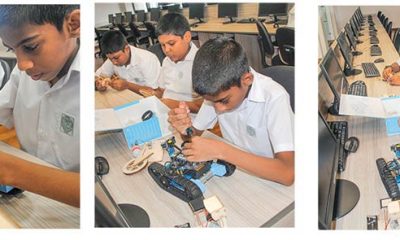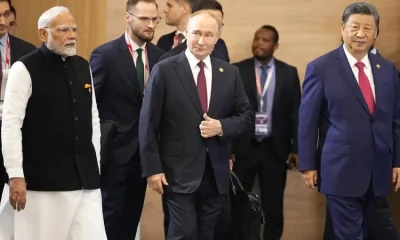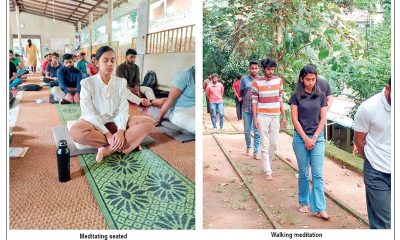Features
Education crisis: A humanitarian crisis

By Dr Tara de Mel
Former Secretary, Ministry of Education
Of all the pandemic-initiated crises, starting with public health and economic, the education crisis has been the one that is often relegated in the list of priorities. When all schools in about 192 countries abruptly shuttered in March 2020 ‘ousting’ nearly 1.6 billion students from education, it chalked a historic milestone in education, globally. Several countries immediately took action to facilitate online and internet-based education for students.
Most economically advantaged countries had a majority of students switching to online education seamlessly. Some less advantaged and low-income countries used the help of international agencies and swiftly took steps to enable internet and device access to students and teachers, in addition to providing pedagogical assistance. Some countries used this historic opportunity to re-design curricula and teaching methodologies to suit the time. Such governments allocated funds for teacher-training and for equipping teachers to meet the post-pandemic education challenges.
(https://en.unesco.org/news/global-education-coalition-explores-digital-learning-turn-africa, and https://theconversation.com/how-african-countries-can-reform-education-to-get-ahead-after-pandemic-school-closures-163935)
This is Sri Lanka
The entire student (4.3 million) and teacher (241,000) populations have been facing crisis after crisis since March 2020. With school closure, less than 10% of students had the ability to connect to real-time face-to-face education, online. The internet accessibility, as per Census 2019 is only 34.11%, and as per a Computer Literacy survey, only 22.2% of households owned a laptop or PC. About 45% of students used parents’ smart phones to access notes sent by teachers using WhatsApp. A study done by LIRNEAsia last year describes these data. (www.lirneasia.net/afteraccess-COVID19). In summary, more than 50% of students had no access to any form of education, since the pandemic.
Since March 2020 teachers have been devoting time, energy and using their own meagre resources to provide some form of education to students. Some have borrowed or pawned personal valuables to buy feature phones. Some have used their own initiative to learn how to conduct classes via zoom, since the technology was new to them, and since no training was offered by the Ministry. Despite all of this, teachers have not been recognised nor compensated for what they have been doing these past 17 months. They only continue to receive their meagre monthly salary of something between Rs 30,000- Rs 35,000. (In 2015 a graduate teacher received Rs 16,500 and in 2019 it had been increased to Rs 33,300. Trained teachers get much less).
In Sri Lanka teachers are the lowest paid group of public servants in all of Asia, and the group that will contribute the most, to creating a new generation of citizens who would be ready to navigate post-pandemic challenges, economic or otherwise.
Take a look at public expenditure on education this past decade. (https://publicfinance.lk/en/topics/Expenditure-on-the-Education-Sector-(2010-%E2%80%93-2019)-1622021647) .
In terms of % GDP allocated for education, see where Sri Lanka resides:
South Africa: 6.5% of GDP
Sri Lanka: 1.9% of GDP
Israel: 6.1% of GDP
New Zealand: 6.3% of GDP
Viet Nam: 4.2% of GDP
Nepal: 5.1% of GDP
Finland: 6.4% of GDP
Middle income countries: 4.4% of GDP
South Asia: 3.5% of GDP
(Source: World Bank data)
Current face-off: sincerity of purpose
For nearly 25 days teachers and Principals are on the streets, risking escalating health-hazards of the ongoing pandemic, and facing multiple threats to life. They are demanding that salary anomalies be rectified. This is turning out to be the most organised, justified and non-politically motivated protest seen in decades. The Government has been watching, almost arrogantly, with no sincere efforts to resolve this crisis.
Salaries and Cadre Commissions (SCC) have been in operation for decades. They could have offered solutions, but haven’t. If the excuse by the Government is delay by SCC, the latter could have sat for several hours a day since July, when the protests began, and resolved this issue by now.
If there was sincerity of purpose this could have been done.
If there is sincerity of purpose here are some suggestions for paying this group of valuable public servants:
1. Government last increased taxes on the liquor and tobacco industry in March 2019. That’s 30 months ago. Excise taxes from liquor and tobacco alone account for Rs. 200 Billion. A 10% increase in tax will yield Rs. 20 Billion per annum.
2. Government tax-cuts in December 2019 resulted in tax revenue declining by Rs. 518 Billion in 2020. Recouping even 10% of that by reversing some of those tax changes, that largely benefitted the upper echelons of society, can yield up to Rs. 50 billion
3. Government has in previous years said that Sri Lanka can’t spend 6% of GDP on education. But today Government has found a way to spend 6.5% of GDP on interest cost alone, each year.
4. In the 2021 budget Government found a way to allocate an additional Rs. 20 Billion for strengthening national security. A sector which already receives close to Rs. 250 Billion per year for recurrent spending alone.
It’s glaringly obvious that it’s not a question of lack of resources. It’s simply a lack of willingness to allocate resources for what ought to be a priority. Again if there was sincerity of purpose they would raise revenue to fund such allocations.
An Appeal
This appeal is for the Government and the Minister to take initiative and ‘blink’ at this faceoff. Be humble. Be gracious. Give the teachers their rightful due and prevent this crisis becoming a humanitarian catastrophe.
Features
Govt.’s anti-corruption agenda gets boost

by Jehan Perera
President Anura Kumara Dissanayake’s statement that the government will not permit the erosion of its mandate for accountable government in the context of the resignation of the Speaker of Parliament is on track with the promises made during the course of the elections that brought the NPP to power. The President reaffirmed his commitment to maintaining public trust, stating his government will take decisive action against any wrongdoing, regardless of rank, and emphasised the government’s mission to uphold the people’s mandate and ensure accountability at all levels. This is an indication that the government will be pursuing its anti-corruption agenda which will help it to retain its support base amongst the people. It will also offer the opportunity to legally and legitimately neutralize or incapacitate political rivals who will stoop to any level to come back to power, if they can be proven to have engaged in corruption.
Tackling the problem of corruption will be advantageous to the government in other ways, too. It will improve the climate for business in the country and, thereby, make Sri Lanka more attractive to foreign investors who have been unreceptive to the allurements, including tax breaks, that successive governments have been offering. The recent US government decision to sanction two Sri Lankans for involvement in corrupt government deals out of only 14 individuals sanctioned worldwide is significant. The sanctions target specific individuals rather than the government, signalling that the US is not against Sri Lanka’s leadership but is, instead, committed to upholding universal principles of justice and transparency. By acting against these individuals implicated in corruption, the US is indirectly reinforcing the government’s mandate to clean up its institutions.
Sri Lanka’s most recent position on the Ease of Doing Business Index (as of its final publication in 2020 before the World Bank discontinued the report) was ranked 99th out of 190 economies. Among the issues highlighted is the pervasive corruption in both public administration and regulatory bodies which leads to delays and demands for unofficial payments, discouraging both domestic and foreign investors. Despite attempts to streamline processes through digitization and one-stop services, corruption often shifts to more sophisticated forms rather than being eliminated. The international community appears to be willing to support the government to overcome the systemic corruption that has permeated society, to take on corrupt former government leaders and to improve the investment climate necessary for rapid economic development.
FLEXIBLE POLICY
Before the presidential election, critics argued that the NPP’s opposition to the IMF agreement risked plunging the country into another economic collapse. Concerns centered on a potential devaluation of the rupee, fuel shortages, and a recurrence of the dire conditions seen during the 2020-2022 crisis. There was a massive political campaign against the ruling NPP on economic grounds. There was a propaganda barrage that claimed that the old-school Marxists in the NPP would take the country to another economic collapse by rejecting the IMF agreement. They also claimed that the Sri Lankan rupee would plummet to a new low again and that there would be long lines outside petrol stations, and shortages of essential commodities that the country had seen three years ago. There was justification that the NPP had no viable alternative to the IMF agreement and yet was contemplating its rejection.
Indeed, at the outset of the presidential election campaign, the NPP (along with other Opposition parties) had been extremely critical of the IMF agreement, negotiated under the supervision of the former President, on the grounds that it was adverse to the interests of the working people and the national interest. Just before the elections, however, the NPP changed its stance to one of accepting the basic structure of the IMF agreement as negotiated under the former President, which it is now sticking to, though not in full measure. It has not, for instance, agreed to the wholesale privatization of state enterprises or to the undermining of the state education and health systems, as might have happened if the previous government continued in power for longer. There is now a discussion on private-public partnerships and as time passes, and the new government gains in confidence about the stability of the economy, there are likely to be more innovations.
The government’s settlement with private international bondholders reflects its commitment to continue on the economic course set by the agreement with the IMF and with the larger international community, including creditor countries, such as China, India and Japan. The government has now gained support from private creditors to restructure its international bonds. Investors, representing close to 98 percent of the country’s USD 12.6 billion in dollar bonds, are expected to agree to swap their securities for new notes. The widespread support would mean that the debt restructuring should be completed before year-end. The debt rework with private creditors was a necessary step under the agreement with the IMF. This appears to be the best option in an economic world in which Sri Lanka is but a small player.
MONEY SHORTAGE
The government’s biggest problem, at the present time, is the lack of money to meet the various expenditures it has to incur. The recent floods and the shortage of rice and coconuts are not of the government’s doings and there is little it can do due to the financial constraints it is under. However, by securing private bondholder cooperation, the government has demonstrated its ability to address complex negotiations. The successful negotiation with private creditors is a positive signal to global investors, bolstering Sri Lanka’s credibility and being better positioned to gain future investments. This can counter the Opposition criticism that the government has reneged on its promises made in its election manifesto and during the election campaign.
The mandate that the government sought was contained in a manifesto publication of 231 pages. There were a large number of promises in it on a wide array of subjects, ranging from arts and culture to economic development and good governance. At the core of the promise was to change the prevalent system in the country to be uncorrupt and to respect the rule of law. These were also the demands of the Aragalaya protest movement of 2022 that drove the then President and government from office through the power of mass movement and street protest. Those protests were motivated by the complete collapse of the economy which the NPP pledged to restore in its manifesto. But this is providing to be difficult in the short term.
Fortunately for the government, the absolute disillusionment of the general population with the other mainstream political parties has meant that the people are willing to be patient and give the government more time to get the economy back on track. Most people accept that the sins of the past cannot be laid at the doors of the present government and that more time is needed for them to be corrected. The government is continuing to maintain its credibility by adherence to its anti-corruption and accountability mandate. The claim to have university qualifications that cannot be shown to be true, has fallen into the realm of accountability that the government has now shown it will demand of its members. The resignation of the Speaker of Parliament, the third ranking member of the government, due to his inability to back his claim of academic achievement, is a sign of this commitment.
Features
What a lineup for New Year’s Eve…

 Next Wednesday (25th) we celebrate Christmas, and a week later…yes, another year has ended and the dawning of a new one (January 1st).
Next Wednesday (25th) we celebrate Christmas, and a week later…yes, another year has ended and the dawning of a new one (January 1st).
Once the Christmas celebrations are over, 31st night revellers will all be looking forward to stepping out…to usher in 2025.
This year there’s plenty of activity, connected with New Year’s Eve, but, I guess, those who are in the mood to celebrate would like to do it differently.
The talk of the town, at the moment, is the James Bond Gala Dinner Dance at the Cinnamon Lakeside Hotel, in Colombo. And dance enthusiasts do have plenty of good reasons to be discussing this special night.
For a 31st night event to be a huge success, two important aspects have to be look at – the music and, of course, the cuisine – and there is no doubt that Cinnamon Lakeside has got it all…and well planned out, too.
The Hotel has got a superb lineup of top artistes to help guests say a nostalgic ‘bye’ to 2024 and usher in 2025 with gaiety.
- Monique (of Gypsies fame)
- Judy De Silva
In the spotlight will be Judy De Silva, Monique (of Gypsies fame), Falan Andrea, Sohan, Geoffrey Fernando (Purple Rain fame) and J-Pal, along with Sohan & The X-Periments and the band AROH.
Doing the needful as compere will be Kumar De Silva. And, for the record, Kumar celebrates his birthday on Friday, December 20th.
I’m told that the entertainers have planned out a repertoire that would keep the guests dancing, and having fun, all night long.
In addition to the top class entertainment, guests would have the opportunity to check out the longest 31st night buffet in the city…with variety plus, plus!
With all his experience in the hotel scene in the UK, Nazoomi Azhar, the new General Manager at Cinnamon Lakeside, is working on making the James Bond Gala Dinner Dance the number one 31st night dance party, in the scene here…with excitement and memories galore!
Sohan, too, indicated that it’s going to be the dance of the year.
Features
In town for festive activities

Sri Lanka-born Roger Menezes, from the land Down Under, is in town to entertain during the festive season.
Now residing in Sydney, Roger is a frequent visitor to his land of birth and is generally seen in action at the Galadari Hotel, in Colombo.
His music is much appreciated by a wide audience, especially those who love the songs of the Golden era, and that is precisely why he had to head for Kandy, no sooner he arrived in Sri Lanka, to perform at the Mahaweli Reach Hotel, on December 15th.
Roger says he has plans to stay here and take in Valentine’s Day as well, February 14th, before going back to Australia.
However, there is a possibility of Roger heading for Australia, sometime in January, 2025, to perform at a 60th wedding anniversary ceremony.
“They asked me if I could do the needful, with air ticket provided, and I said ‘It can be done.’ And I’ll be back in Colombo, probably a week later,” said Roger.
Although Roger has been residing in Australia for decades, he still considers Sri Lanka is home.
“Who knows, one day I may pack my bags and return to my land of birth…permanently,” he quipped.
-

 Opinion7 days ago
Opinion7 days agoFuture of SriLankan
-

 Opinion2 days ago
Opinion2 days agoDegree is not a title!
-

 Features5 days ago
Features5 days agoEmpowering the next generation: St. Benedict’s College brings STEM education to life
-

 Sports7 days ago
Sports7 days agoJayasuriya backs Kamindu Mendis
-

 Features7 days ago
Features7 days agoBRICS and De-Dollarization: Implications for India and Global Power Dynamics
-

 Features3 days ago
Features3 days agoSpiritual Awakening of a Village
-

 News4 days ago
News4 days agoOver 300,000 Sri Lankans leave for overseas jobs this year
-

 Business7 days ago
Business7 days agoStrengthening Sri Lanka’s retail future through loyalty and innovation













